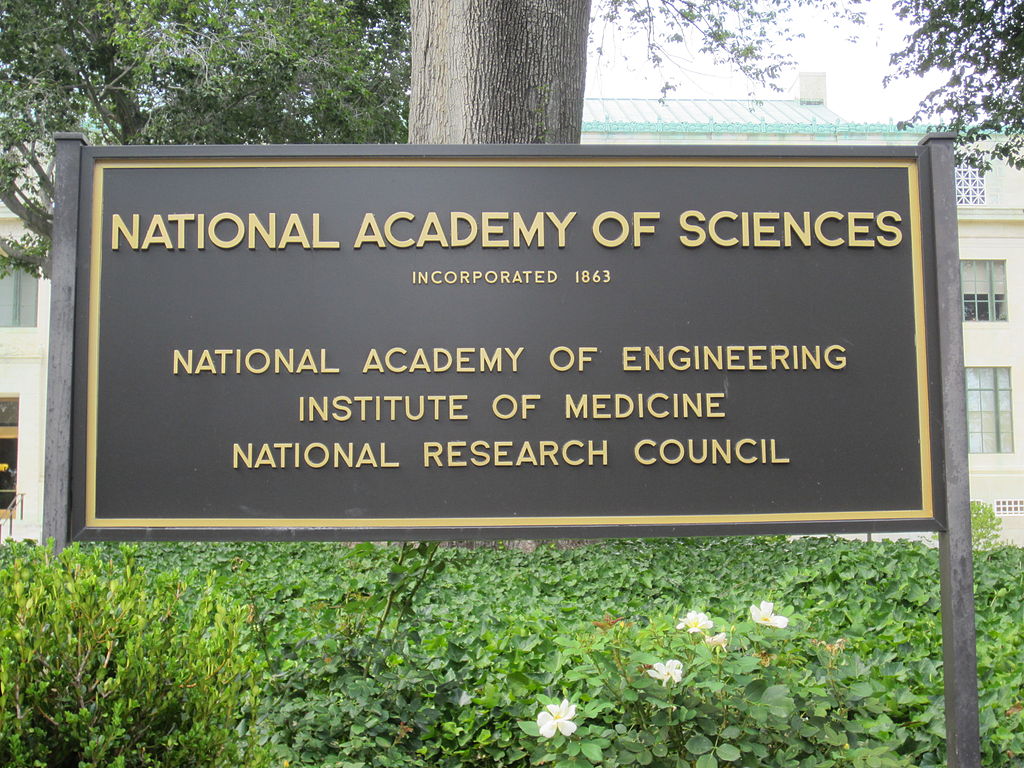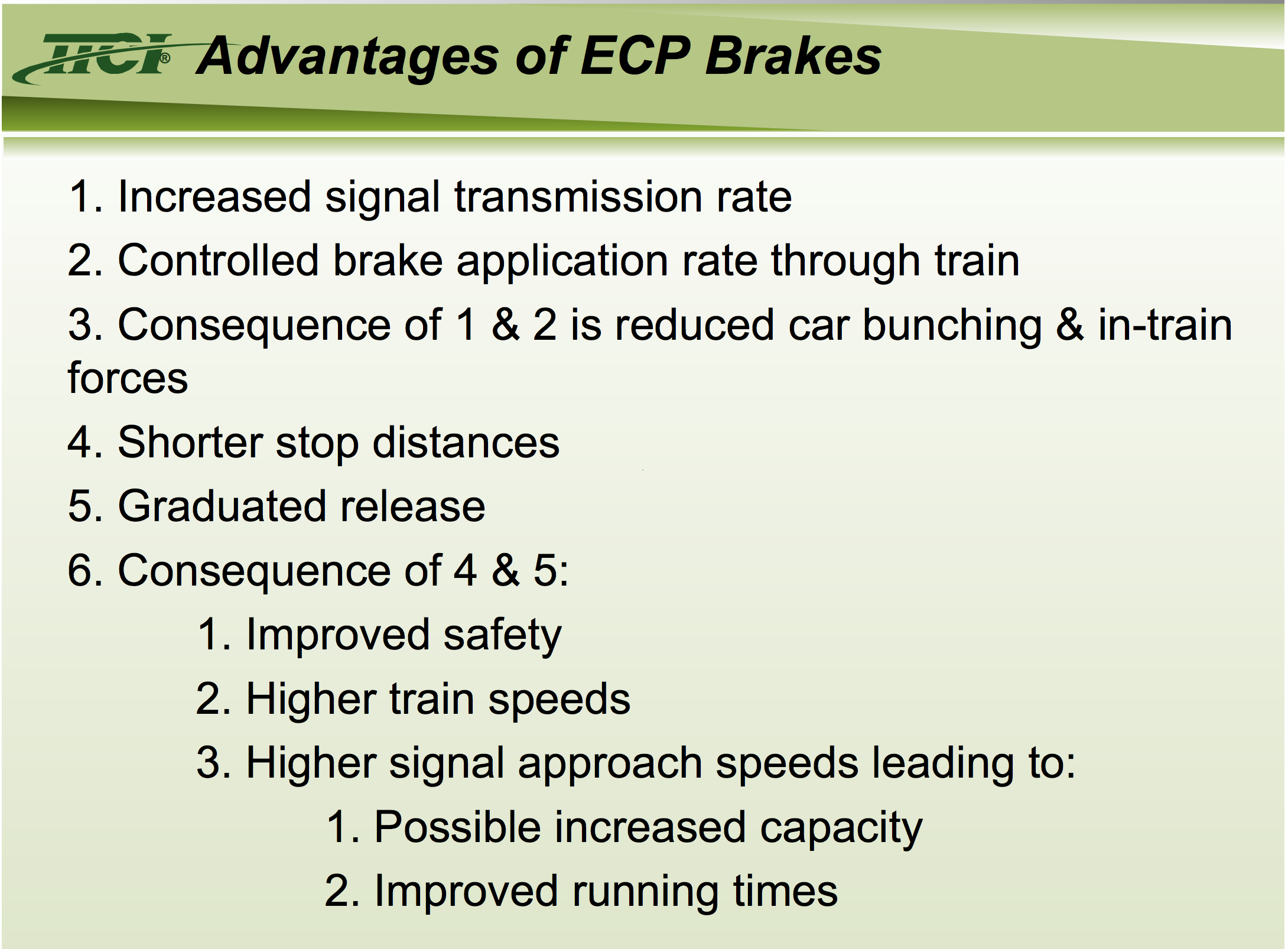A new study by the National Academy of Sciences concludes that the rail industry should do more to improve the safety of transporting oil and ethanol by rail, which includes addressing track safety and rail tank cars. Both of these are well-known safety issues.
However, the study, “Safely Transporting Hazardous Liquids and Gases in a Changing U.S. Energy Landscape,” also cites a separate NAS study “A Review of the Department of Transportation Plan for Analyzing and Testing Electronically Controlled Pneumatic Brakes” and notes that after reviewing available data, the researchers were unable to “make a conclusive statement” on the safety technology known as electronically controlled pneumatic (ECP) brakes.* This is where things get interesting.
“The committee was unable to make a conclusive statement about the emergency performance of ECP brakes relative to other braking systems on the basis of the results of testing and analysis provided by U.S. DOT.”
Eliminating the current regulations to require ECP brakes on oil trains beginning in 2021 has been the top priority of the rail industry and its lobbyists since the regulations were finalized in 2015. This study must have been well received in the corporate boardrooms of the rail industry.
As we have noted on DeSmog, the rail industry has already tried multiple methods of removing this regulation: pushing the Senate to do it, including new research requirements in the FAST Act of 2015, and introducing a new bill in the Senate designed to attack the regulation.
And the industry has been quite blunt about its intentions all along. Shortly after the regulations were announced, Matthew Rose, CEO of leading oil-by-rail company BNSF, made it clear that the rail industry would not accept this requirement for ECP brakes, telling an audience at the annual Energy Information Administration conference that “the only thing we don’t like about it [the new regulations] is the electronic braking” and “this rule will have to be changed in the future.”
And it looks like BNSF and its fellow rail companies are going to get this wish.
Ignoring the Science?
Shortly after the Senate introduced its latest bill related to rail safety regulations, a RailwayAge opinion piece came out supporting this industry-friendly bill. The op-ed noted that the industry was particularly interested in rolling back the requirement to have ECP brakes on oil trains, saying this regulation was “troubling to railroads and the scientific community.”
There is no doubt that the regulation is troubling to the railroads — the industry and its lobbyists have made that quite clear. This new analysis by the National Academy of Sciences makes it appear that the scientific community might be troubled by it as well — except for the fact that the majority of research on the subject actually supports that ECP brakes are a far superior braking system.
During the Obama administration, Cynthia Quarterman led the Pipeline and Hazardous Materials Safety Administration (PHMSA) for most of the multi-year process of developing new oil-by-rail regulations. Her conclusion? She believes ECP brakes are a top safety priority.
“The more I think about it, the more I think that the ECP brakes may be more important than the tank car itself,” Quarterman told USA Today. “Because it would stop the pileup of the cars when there’s a derailment or when there’s a need to brake in a very quick fashion.”
The superior performance of ECP brakes has been known for a long time. In 2006, Joseph Boardman, the administrator of the Federal Railroad Administration (FRA), explained why ECP brakes were superior.
“ECP brakes are to trains what antilock brakes are to automobiles — they provide better control,” he said. He also is on the record saying that ECP braking “offers a quantum improvement in rail safety.”
John Risch is a national legislative director for SMART–TD, a labor union that represents employees on every Class I railroad, Amtrak, and on many regional and shortline railroads. As recently as 2009, Risch was operating trains hauling coal and has 40 years of experience in the rail industry. In March, he spoke at the Congressional Committee on Transportation and Infrastructure’s Roundtable on Emerging Railroad Technologies and specifically addressed ECP brakes.
“In all that I’ve seen in my 40 years, the greatest safety improvement, bar none, is Electronically Controlled Pneumatic (ECP) train brakes,” Risch told the committee.
In 2006 the FRA hired Booze Allen Hamilton to study the effectiveness of ECP brakes, the result of which found the following conclusion:
“Electronically Controlled Pneumatic (ECP) brakes are a tested technology that offers major benefits in freight train handling, car maintenance, fuel savings, and network capacity. Their use could significantly enhance rail safety and efficiency.”
And the science continues to back this up. While the Federal Railroad Administration was calling ECP brakes a “proven technology” in 2015 based on existing research, a 2016 study on ECP braking led by engineering researchers at the University of Illinois at Chicago found that “the use of ECP brakes over conventional air brakes resulted in a 40 percent reduction in stopping distance and a lower risk of derailment, demonstrating a clear safety benefit,” according to Brynn Nicolsen, a research assistant at the University of Illinois at Chicago who is currently working on rail research regarding the impacts of sloshing in rail tank cars.
So why would the National Academy of Sciences be unable to make a conclusive statement on the effectiveness of this safety technique? Nicolsen gave the following explanation to DeSmog via email:
“The models that are often used by government groups are very simplified … While these models are easy to develop and the simulations run quickly, they are inadequate for several reasons. It is not that surprising to me that their simple models do not demonstrate the effectiveness of ECP brakes. However, as has been shown in the literature, using a more high-fidelity model can show the increased braking torques and reduced stopping distances when ECP brakes are used, compared to conventional brakes.”
So if the National Academy is only looking at data based on simple models, it is reasonable to believe that a conclusive statement could not be made about ECP brakes. But why would they not look at the much wider body of research and data that is available and has convinced so many others that ECP brakes are superior, if they indeed did want to reach a conclusive statement? The study “A Review of the Department of Transportation Plan for Analyzing and Testing Electronically Controlled Pneumatic Brakes” recommends that what is needed is more testing of ECP braking technology.
This approach of continuing to test proven technologies and known science while not reviewing all of the existing literature and science effectively results in delays in implementing new safer technologies.
The National Academy did not respond to multiple requests for comment.
American Association of Railroads Funding Research
The American Association of Railroads (AAR), a major industry trade group, is in an odd position when it comes to ECP brakes. They were for them before they were against them. As DeSmog has noted, the AAR argued in 2004 that ECP brakes would make the transportation of nuclear waste by rail safer.
In a presentation by the Transportation Technology Center Inc. (an organization fully funded by the AAR), the center summarized the benefits of ECP braking, including “improved safety.”
But all of that changed in 2015 when regulations required ECP brakes on oil trains starting in 2021. Since then, the AAR has run ads attacking ECP braking technology. The trade group also penned a press release attacking the technology with its CEO Ed Hamberger saying, “Industry research and years of experimenting in real-world operating environments show ECP brakes are unreliable and have a minimal safety impact over conventional braking systems currently in place.”
This contradicts what the AAR and the Transportation Technology Center Inc. — as well as scientific research — had previously found. But this new position is more in line with what the CEO of BNSF wants, which shouldn’t be surprising that the top rail lobbying organization has changed its tune as well.
The recent National Academy of Sciences study was conducted by the Transportation Research Board, one of the programs within the academy. While the board is mostly funded by government entities, it does also receive funding from the AAR.
The current nominee to lead the FRA is a former rail CEO and the current head of PHMSA is a former CSX rail executive. This regulatory environment is looking highly favorable for rail companies and their priorities. Expect the ECP braking regulation to be repealed.
*Updated 11/10/17: This article initially noted that the NAS study “Safely Transporting Hazardous Liquids and Gases in a Changing U.S. Energy Landscape,” was unable to “make a conclusive statement” on ECP braking. That quote was actually referring to a separate NAS study “A Review of the Department of Transportation Plan for Analyzing and Testing Electronically Controlled Pneumatic Brakes” that was unable to make a conclusive statement. We regret this error.
Main image: National Acadamy of Sciences. Credit: Another Believer, CC BY–SA 3.0
Subscribe to our newsletter
Stay up to date with DeSmog news and alerts







